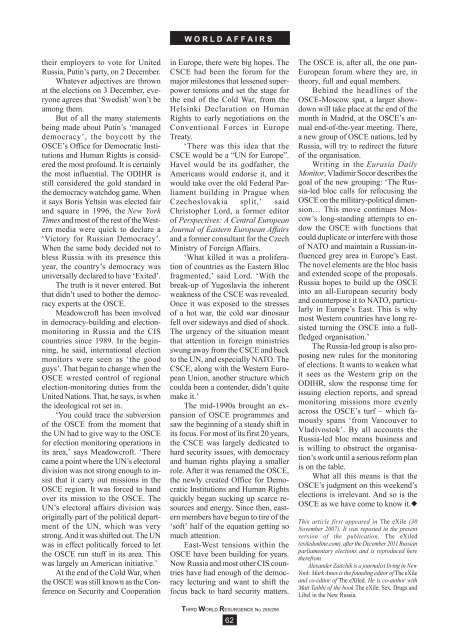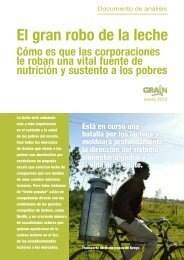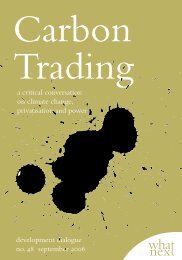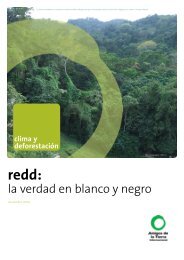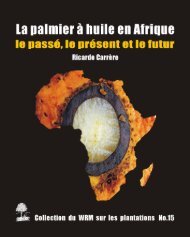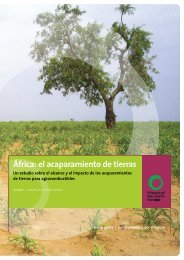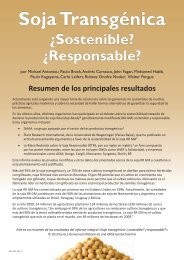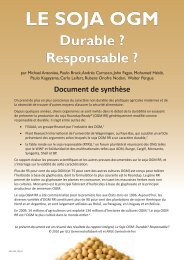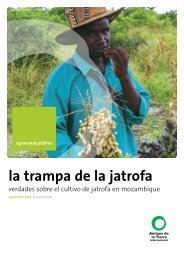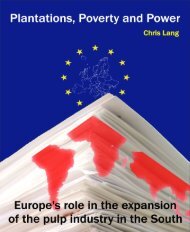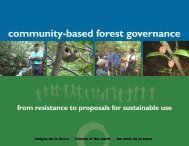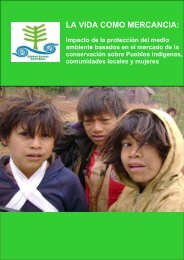Download - Third World Network
Download - Third World Network
Download - Third World Network
Create successful ePaper yourself
Turn your PDF publications into a flip-book with our unique Google optimized e-Paper software.
W O R L D A F F A I R Stheir employers to vote for UnitedRussia, Putin’s party, on 2 December.Whatever adjectives are thrownat the elections on 3 December, everyoneagrees that ‘Swedish’ won’t beamong them.But of all the many statementsbeing made about Putin’s ‘manageddemocracy’, the boycott by theOSCE’s Office for Democratic Institutionsand Human Rights is consideredthe most profound. It is certainlythe most influential. The ODIHR isstill considered the gold standard inthe democracy watchdog game. Whenit says Boris Yeltsin was elected fairand square in 1996, the New YorkTimes and most of the rest of the Westernmedia were quick to declare a‘Victory for Russian Democracy’.When the same body decided not tobless Russia with its presence thisyear, the country’s democracy wasuniversally declared to have ‘Exited’.The truth is it never entered. Butthat didn’t used to bother the democracyexperts at the OSCE.Meadowcroft has been involvedin democracy-building and electionmonitoringin Russia and the CIScountries since 1989. In the beginning,he said, international electionmonitors were seen as ‘the goodguys’. That began to change when theOSCE wrested control of regionalelection-monitoring duties from theUnited Nations. That, he says, is whenthe ideological rot set in.‘You could trace the subversionof the OSCE from the moment thatthe UN had to give way to the OSCEfor election monitoring operations inits area,’ says Meadowcroft. ‘Therecame a point where the UN’s electoraldivision was not strong enough to insistthat it carry out missions in theOSCE region. It was forced to handover its mission to the OSCE. TheUN’s electoral affairs division wasoriginally part of the political departmentof the UN, which was verystrong. And it was shifted out. The UNwas in effect politically forced to letthe OSCE run stuff in its area. Thiswas largely an American initiative.’At the end of the Cold War, whenthe OSCE was still known as the Conferenceon Security and Cooperationin Europe, there were big hopes. TheCSCE had been the forum for themajor milestones that lessened superpowertensions and set the stage forthe end of the Cold War, from theHelsinki Declaration on HumanRights to early negotiations on theConventional Forces in EuropeTreaty.‘There was this idea that theCSCE would be a “UN for Europe”.Havel would be its godfather, theAmericans would endorse it, and itwould take over the old Federal Parliamentbuilding in Prague whenCzechoslovakia split,’ saidChristopher Lord, a former editorof Perspectives: A Central EuropeanJournal of Eastern European Affairsand a former consultant for the CzechMinistry of Foreign Affairs.‘What killed it was a proliferationof countries as the Eastern Blocfragmented,’ said Lord. ‘With thebreak-up of Yugoslavia the inherentweakness of the CSCE was revealed.Once it was exposed to the stressesof a hot war, the cold war dinosaurfell over sideways and died of shock.The urgency of the situation meantthat attention in foreign ministriesswung away from the CSCE and backto the UN, and especially NATO. TheCSCE, along with the Western EuropeanUnion, another structure whichcoulda been a contender, didn’t quitemake it.’The mid-1990s brought an expansionof OSCE programmes andsaw the beginning of a steady shift inits focus. For most of its first 20 years,the CSCE was largely dedicated tohard security issues, with democracyand human rights playing a smallerrole. After it was renamed the OSCE,the newly created Office for DemocraticInstitutions and Human Rightsquickly began sucking up scarce resourcesand energy. Since then, easternmembers have begun to tire of the‘soft’ half of the equation getting somuch attention.East-West tensions within theOSCE have been building for years.Now Russia and most other CIS countrieshave had enough of the democracylecturing and want to shift thefocus back to hard security matters.The OSCE is, after all, the one pan-European forum where they are, intheory, full and equal members.Behind the headlines of theOSCE-Moscow spat, a larger showdownwill take place at the end of themonth in Madrid, at the OSCE’s annualend-of-the-year meeting. There,a new group of OSCE nations, led byRussia, will try to redirect the futureof the organisation.Writing in the Eurasia DailyMonitor, Vladimir Socor describes thegoal of the new grouping: ‘The Russia-ledbloc calls for refocusing theOSCE on the military-political dimension…This move continues Moscow’slong-standing attempts to endowthe OSCE with functions thatcould duplicate or interfere with thoseof NATO and maintain a Russian-influencedgrey area in Europe’s East.The novel elements are the bloc basisand extended scope of the proposals.Russia hopes to build up the OSCEinto an all-European security bodyand counterpose it to NATO, particularlyin Europe’s East. This is whymost Western countries have long resistedturning the OSCE into a fullfledgedorganisation.’The Russia-led group is also proposingnew rules for the monitoringof elections. It wants to weaken whatit sees as the Western grip on theODIHR, slow the response time forissuing election reports, and spreadmonitoring missions more evenlyacross the OSCE’s turf – which famouslyspans ‘from Vancouver toVladivostok’. By all accounts theRussia-led bloc means business andis willing to obstruct the organisation’swork until a serious reform planis on the table.What all this means is that theOSCE’s judgment on this weekend’selections is irrelevant. And so is theOSCE as we have come to know it.uThis article first appeared in The eXile (30November 2007). It was reposted in the presentversion of the publication, The eXiled(exiledonline.com), after the December 2011 Russianparliamentary elections and is reproduced heretherefrom.Alexander Zaitchik is a journalist living in NewYork. Mark Ames is the founding editor of The eXileand co-editor of The eXiled. He is co-author withMatt Taibbi of the book The eXile: Sex, Drugs andLibel in the New Russia.THIRD WORLD RESURGENCE No 255/25662


